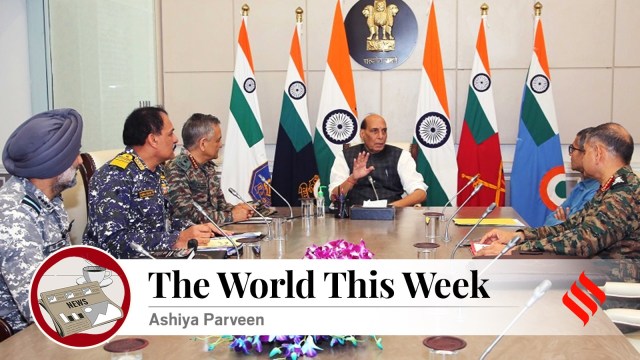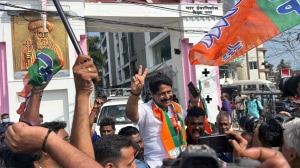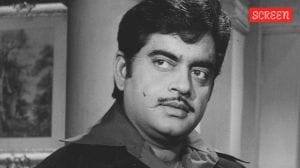
Soon after the announcement of ceasefire on Saturday evening by India and Pakistan, cross-border firing from Pakistan was reported at several locations along the Jammu border.
Foreign Secretary Vikram Misri late Saturday called upon Pakistan to address the repeated violations along India’s northern and western borders after the two countries signed a ceasefire with “immediate effect”.
He added that the Indian armed forces, on strong vigil, were giving an appropriate and adequate response to the “breach of understanding”. Blackouts were enforced after multiple explosions and sirens were heard on Saturday night in Jammu and Kashmir’s Srinagar and Anantnag, Barmer (Rajasthan) and Kutch in Gujarat.
On Saturday evening (May 10, 2025), Foreign Secretary Misri said that the Directors General of Military Operations (DGMOs) of the two countries had agreed between them that both sides “would stop all firing and military action”.
The briefing came shortly after US President Donald Trump announced on social media that New Delhi and Islamabad had agreed to a “full and immediate” ceasefire.
Story continues below this ad
However, India insists that India and Pakistan came to an understanding bilaterally and there was “no third party involvement”.
Although officials have not reported any more violations since Saturday evening’s firing after the ceasefire came into effect, the Indian Air Force (IAF) today urged “all to refrain from speculation and dissemination of unverified information” as “the Operations are still ongoing”.
The IAF also added that it “has successfully executed its assigned tasks in Operation Sindoor, with precision and professionalism. Operations were conducted in a deliberate and discreet manner, aligned with National Objectives.”
Meanwhile, normalcy returns to border areas after days of cross-border firing and military actions as residents along the LoC were reported to be going back to their homes. A sense of calm also settled in Punjab and Rajasthan.
Story continues below this ad
A sharp escalation in cross-border shelling erupted after an Indian military operation – Operation Sindoor – on Wednesday targeted nine terrorist sites in Pakistan and Pakistan-occupied Kashmir. The operation came in the aftermath of the deadliest terror attack in Kashmir’s Pahalgam on April 22, 2025 in which terrorists with links to Pakistan’s military-intelligence killed 26 people.
On Saturday morning, India described Pakistan’s actions in the last three days as “escalatory” and “provocative”. Pakistan’s military attempted air intrusions at more than 26 locations from Srinagar to Nalia, which the Indian military was able to “neutralise”.
Pakistan also attempted multiple air intrusions, targeted civilians and civilian and military infrastructure using drones and long-range weapons.
Col Sofiya Qureshi, during the MEA press conference on Saturday (May 10, 2025), confirmed that “air launched precision weapons” were used to target Pakistan’s air bases, and added that the Pakistani military had been observed to be “moving their troops into forward areas”. “Indian armed forces remain in a high state of operational readiness.”
Story continues below this ad
Meanwhile, US President Donald Trump on Sunday (May 11, 2025) praised the “strong and unwaveringly powerful” leadership of India and Pakistan for reaching a “ceasefire”.
“I will work with you both to see if, after a “thousand years,” a solution can be arrived at concerning Kashmir. God Bless the leadership of India and Pakistan on a job well done!!!” Trump said in a post on Truth Social.
Trump’s statement came against the backdrop of the International Monetary Fund clearing $2.3 billion in funding for cash-strapped Pakistan on Friday, even as New Delhi abstained from the vote. India firmly opposed the move stating providing funds to a country that supports cross-border terrorism carries reputational risks and undermines international norms.
India signs FTA with UK; China, US to hold trade talks
Nonetheless, India continued to deepen its global economic ties and signed a Free Trade Agreement (FTA) with the UK this week. It is arguably the most comprehensive deal that New Delhi has inked with a major developed country, underlining its openness to embrace freer trade and integrate more deeply with global supply chains.
Story continues below this ad
The agreement came amid the US and China apparently seeking to ease their prolonged trade standoff with US President Donald Trump suggesting that an 80% tariff on Chinese goods “seems right”, ahead of closely watched weekend talks between the world’s two largest economies.
Against this backdrop, India’s trade deal with the UK is viewed through a geo-strategic lens — apparently aimed at positioning India as an alternative manufacturing hub to China. Trump tariffs prompted a realignment of the global supply chain, while the UK, EU alongside the US introduced measures to reduce dependence on China and protect their domestic markets.
And the trade deal with the UK is particularly significant for India’s rapidly growing services sector, as integration with the UK — where 80 per cent of output comes from services—could boost India’s growth.
The agreement was finalised after several rounds of negotiations and involved discussions over contentious issues such as the carbon tax. Negotiations had first begun in 2013 but were abandoned due to differences.
Story continues below this ad
Bilateral trade between the two countries is about $60 billion, and is projected to double by 2030. The trade deal will eliminate tariffs levied by the UK on about 99 per cent of products, including labour intensive sectors (such as textiles, footwear) and manufacturing industries (like electrical machinery and automobile components).
On its part, Delhi has lowered tariffs on whiskey and gin to 75 per cent, and further to 40 per cent over 10 years. It has also reduced automotive tariffs to 10 per cent under a quota. Other areas where duties have been lowered are cosmetics, aerospace products, and medical devices.
This trade deal with the UK has been finalised at a time when India is also holding discussions on similar deals with countries/regions such as the US, the EU, Chile and Peru.
Meanwhile, all eyes are on the US-China trade negotiations after Trump suggested a specific alternative of 80% tariffs on Chinese goods to the current 145% imposed on Chinese imports.
Story continues below this ad
US Treasury Secretary Scott Bessent and chief trade negotiator Jamieson Greer will meet Chinese economic tsar He Lifeng in Switzerland to discuss the damaging trade war between the world’s two biggest economies, which has already entangled global supply chains.
“China should open up its market to USA — would be so good for them!!! Closed markets don’t work anymore!!!” Trump posted on Truth Social. “80% tariff on China seems right. Up to Scott B,” he added, leaving final judgment to his treasury secretary.
Israel eyes entire Gaza; Saudi nuclear talks, arms package on Trump’s list
Meanwhile, America’s foreign policy remains tested in West Asia which is undergoing a seismic churn evident in several flashpoints across the region. Israel deepens its offensive in Gaza and continues hostilities with Yemen’s Houthis.
The US signed a ceasefire agreement with Iran-backed Houthis. Most importantly, President Trump reportedly hinted at decoupling Saudi nuclear talks from diplomatic normalisation with Israel ahead of his visit to Saudi Arabia next week.
Story continues below this ad
Ahead of US President Donald Trump’s visit to the region, Reuters reported that normalisation of ties with Israel is no longer a condition for progress on civil nuclear cooperation with Saudi Arabia. A potential $100 billion arms package is part of economic deals that Trump will discuss during his visit to the Kingdom on May 13. He is also expected to visit Qatar and the UAE.
Reuters cited sources as saying that delinking Saudi nuclear talks with diplomatic normalisation with Israel is a major concession from the US. The ongoing war in Gaza scuttled the process of normalisation as part of the Abraham Accords signed during Trump’s first term between Israel and the UAE, Bahrain and Morocco. Saudi Arabia has said it would not recognise Israel without a Palestinian state.
Meanwhile, Israel’s security cabinet approved an expanded military operation in Gaza, as Israeli Prime Minister Benjamin Netanyahu said the population of Gaza will be displaced to the south.
In a Hebrew-language video message on X, addressing the Security Cabinet-approved plan to expand the Gaza offensive, Netanyahu said on Monday that Gaza’s Palestinian population “will be moved, for its own protection”, Al Jazeera reported.
The expanded offensive “could go as far as seizing the entire enclave”, Reuters reported. The Gaza Strip is home to more than 2 million Palestinians.
In the meantime, the Houthis continued its attack on Israel and launched a missile towards Israel on Friday. Israel’s military said it intercepted the projectile using its air defence systems.
Just a day before, the US and the Houthis agreed that they would not target each other, including the American vessels in the Red Sea, as part of an Oman-mediated ceasefire. But the Yemeni group said the agreement did not include Israel.
Omani Foreign Minister Badr Albusaidi wrote in a post on X, “In the future, neither side will target the other, including American vessels, in the Red Sea and Bab al-Mandab Strait, ensuring freedom of navigation and the smooth flow of international commercial shipping.”
The Houthis have attacked US Navy ships and commercial vessels in the Red Sea and the Gulf of Aden – two critical waterways to international shipping routes – since October 2023 when Israel went to war in Gaza. The group says its military campaign is in solidarity with Palestinians. The US responded by launching airstrikes against the group.
The ceasefire was announced hours after the Israeli military launched air strikes on the airport in the Yemeni capital Sanaa and rendered it inoperable. Israel said it was a response to the Houthis’ attack on Ben-Gurion International Airport on Sunday, which briefly halted flights and commuter traffic at the country’s main international airport.
US, Europe press Russia for ceasefire
European leaders on Saturday held talks with Ukraine’s President Volodymyr Zelenskyy in Kyiv and ramped up pressure on Russia to agree to 30-day ceasefire starting on Monday.
French President Emmanuel Macron, German Chancellor Friedrich Merz, British Prime Minister Keir Starmer and Polish Prime Minister Donald Tusk arrived in Kyiv on Saturday and held a joint news conference with Zelenskyy.
The proposed ceasefire would include a halt to fighting on land, sea and in the air. The European leaders threatened Russia with “massive sanctions”, including on its energy and banking sectors, if it refuses to comply.
A force comprised of foreign troops could also be deployed as an added “reassurance” measure, Macron said. He added that the US would take the lead in monitoring a proposed cease-fire, with support from European countries, Al Jazeera reported.
Nonetheless, Russian President Vladimir Putin later effectively rejected the ceasefire offer and proposed restarting direct talks with Ukraine in Istanbul on May 15 instead “without preconditions”, The Associated Press reported. He said a ceasefire might be agreed on during the negotiations.
Trump on Thursday called for a 30-day unconditional ceasefire between Russia and Ukraine, and said that if the truce was not respected then “the US and its partners will impose further sanctions.”
While Ukraine expressed readiness to accept the US proposal, Russia said it supports the ceasefire but only with due consideration of ‘nuances’ in war.
 Britain’s Prime Minister Keir Starmer, left, France’s President Emmanuel Macron, 2nd left, Poland’s Prime Minister Donald Tusk , right, Ukraine’s President Volodymyr Zelensky, 2nd right, and Germany’s Chancellor Friedrich Merz, 3rd right, meet at the Mariinskyi Palace, in Kyiv. (AP Photo)
Britain’s Prime Minister Keir Starmer, left, France’s President Emmanuel Macron, 2nd left, Poland’s Prime Minister Donald Tusk , right, Ukraine’s President Volodymyr Zelensky, 2nd right, and Germany’s Chancellor Friedrich Merz, 3rd right, meet at the Mariinskyi Palace, in Kyiv. (AP Photo)
This week, Russia marked the 80th anniversary of the Soviet Union’s victory over Nazi Germany in WWII with a major military parade, which was attended by several leaders, including Chinese President Xi Jinping and Brazilian President Luiz Inacio Lula da Silva.
On May 8, 1945, Nazi Germany’s unconditional surrender was marked as “Victory in Europe Day” by Britain, the US and France. In Moscow it was already May 9, which became the Soviet Union’s “Victory Day”.
Ukraine marked the anniversary with a flower-laying ceremony at the Tomb of Unknown Soldier monument attended by President Volodymyr Zelenskiy, his wife Olena, and other leaders.
However, earlier this week, the two sides carried out attacks on each other. Ukrainian long-range drones caused flight disruption at Moscow’s main airports for a third straight day on Wednesday, while Russia launched a ballistic missile and a barrage of drones at Ukraine’s capital before dawn on Wednesday, killing at least two people.
On Sunday, The Associated Press reported that Russian President Vladimir Putin has said that the need to use nuclear weapons in Ukraine had not arisen and that he hopes it will not.
Responding to a question about Ukrainian strikes on Russian territory, Putin said: “There has been no need to use those (nuclear) weapons … and I hope they will not be required.”
UN warns of worsening catastrophe in Sudan
Meanwhile, violence flared elsewhere as Sudan’s paramilitary launched drone strikes on the Red Sea city of Port Sudan, targeting an airport, a major power station and a hotel on Tuesday, prompting the UN to warn that any further escalation could worsen the situation.
The Sudanese army blamed the paramilitary Rapid Support Forces (RSF) for the attack and said it had foiled a strike on the country’s biggest naval base on Wednesday.
Port Sudan serves as an interim seat for Sudan’s military-allied government and as a place of refuge for people fleeing Sudan’s two-year war between the military and the paramilitary RSF. The city is the main entry point for relief supplies as it hosts airports and direct access to the Red Sea.
The UN chief warned that any further escalation of the conflict could result in massive civilian casualties and worsen the already catastrophic humanitarian situation across the country.
“The expansion of the conflict into an area that has served as a place of refuge for a large number of displaced people is alarming,” UN Secretary-General António Guterres said in a statement issued by his Spokesperson’s office on Thursday (May 8, 2025).
On Tuesday, Sudan’s Defence Minister Yassin Ibrahim accused the UAE of violating his country’s sovereignty through its “proxy”, the RSF, and said severing ties with the Gulf nation, BBC reported.
The UAE has repeatedly denied allegations that it is giving financial, military and political support to the paramilitary force.
On Monday, the UN’s top court dismissed Sudan’s case against the UAE, in which it accused the Gulf state of complicity in genocide.
The International Court of Justice in The Hague ruled that the case could not proceed because the UAE had opted out Article 9 of the Genocide Convention, which means that it cannot be sued by other states over genocide allegations.
Sudan plunged into chaos in April 2023, when simmering tensions between the military and the RSF exploded into open warfare in Khartoum. From there, the fighting spread to other parts of the country.
Since then, at least 24,000 people have been killed, though the number is likely far higher. The war has driven about 13 million people from their homes, including four million who crossed into neighboring countries. It also pushed parts of the country into famine.
Pope calls his election a cross and a blessing as he celebrates first mass
Amid the ongoing turmoil gripping the world, the election of US-born Robert Francis Prevost as the 267th Pope on Thursday (May 8, 2025) offered a moment of hope, especially for the world’s 1.4 billion Catholics.
The 69-year-old Chicago-born pontiff, who picked the papal name Leo XIV, celebrated his first Mass as the head of the Catholic Church on Friday and said that his election was both a cross to bear and a blessing.
“You have called me to carry that cross and to be blessed with that mission, and I know I can rely on each and every one of you to walk with me as we continue as a church, as a community, as friends of Jesus, as believers, to announce the good news, to announce the Gospel,” The Associated Press cited Leo as saying in the Sistine Chapel to the cardinals who elected him.
Cardinals from around the world elected Leo, who is a dual US-Peru national, after two days of deliberations at the papal conclave – a ritual that has been followed to elect a Pope since 1179.
Leo’s election came against the traditional prohibition against a Pope from the US. There had long been a taboo on a US Pope, given America’s superpower status in the secular world.
Therefore, Leo’s election as the new Pope surprised the world, with US President Donald Trump saying, “we’re a little bit surprised and we’re happy”, as he called the historic election a “great honour” for the country.
It is said that in naming himself Leo, the new Pope could also have wanted to signal a strong line of continuity: Brother Leo was the 13th century friar who was a great companion to St.Francis of Assisi, the late Pope’s namesake.
Leo will be formally installed as Pope at a Mass on May 18, the Vatican said Friday, and will preside over his first general audience on May 21.
Post Read Questions
Amid trade war between the US and China, India’s trade deal with the UK is viewed through a geo-strategic lens — apparently aimed at positioning India as an alternative manufacturing hub. Evaluate.
How is the India-UK Free Trade Agreement particularly significant for India’s rapidly growing services sector?
US President Donald Trump hints at delinking Saudi nuclear talks from diplomatic normalisation with Israel. What does this reveal about the evolving security architecture in West Asia?
Russia observes the 80th anniversary of the Soviet Union’s victory over Nazi Germany in WWII on May 9, while Ukraine observes it on May 8. Explain historical and political reasons behind the divergence in dates.
Send your feedback and ideas to ashiya.parveen@indianexpress.com.



 Britain’s Prime Minister Keir Starmer, left, France’s President Emmanuel Macron, 2nd left, Poland’s Prime Minister Donald Tusk , right, Ukraine’s President Volodymyr Zelensky, 2nd right, and Germany’s Chancellor Friedrich Merz, 3rd right, meet at the Mariinskyi Palace, in Kyiv. (AP Photo)
Britain’s Prime Minister Keir Starmer, left, France’s President Emmanuel Macron, 2nd left, Poland’s Prime Minister Donald Tusk , right, Ukraine’s President Volodymyr Zelensky, 2nd right, and Germany’s Chancellor Friedrich Merz, 3rd right, meet at the Mariinskyi Palace, in Kyiv. (AP Photo)





























